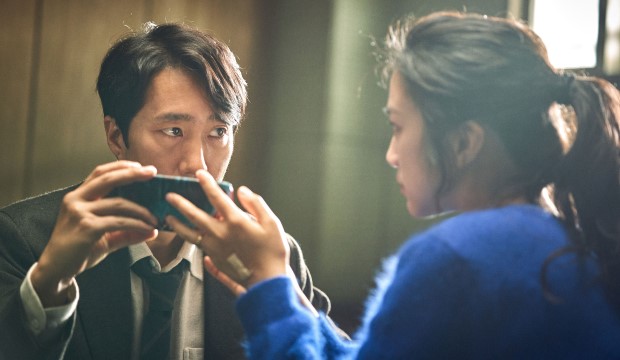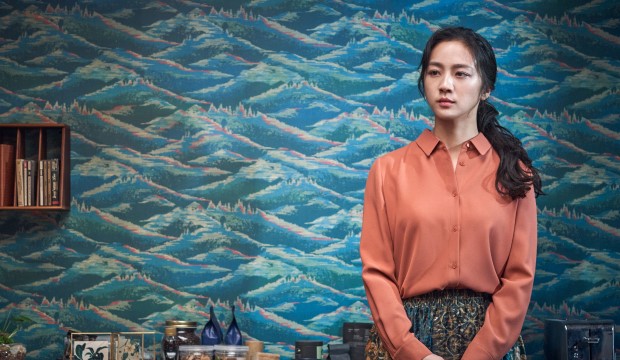Decision to Leave review ★★★★★
The new movie from Korean director Park Chan-wook follows a Busan-based detective (Park Hae-il) on a murder case who falls in love with the chief suspect (Tang Wei)
Park Hae-il and Tang Wei in Decision to Leave (Photo: MUBI)
Park
Chan-wook is one of those rare filmmakers who, with every shot, appears to lead
a militia against mundanity. No visual composition in his latest project Decision to Leave is humdrum or formulaic, and you rarely predict what's coming next. Similar to what Martin Amis wrote about James Joyce, sitting through this film is like watching a war against cliché. Each cut provides something new, something strange, and that's thrilling in itself.
That war bleeds into the writing, with Park rejoining his regular co-writer Chung Seo-kyung (The Handmaiden) for another disorientating narrative framework.
The story itself is rather basic: a neo-noir tangled in a romantic melodrama. But both are locked in a frustrating puzzle box, the code for which makes you realise how comprehensible the whole thing is. Park has claimed that, contrary to his previous films, he wanted ‘simplicity’. With Decision to Leave, he tells a simple story as complexly as possible.

Park Hae-il and Tang Wei as Hae-jun and Seo-rae. Photo: MUBI
Detective Hae-jun (Park Hae-il) of a Busan police department is morally and meticulously good at his job. When investigating a potential murder on a mountain, he scales the summit with his complaining partner strapped to his back. He has insomnia, making him ideal for stakeouts when the murdered man’s widow, the Chinese-born Seo-rae (Tang Wei), becomes a suspect. After a series of observations and interrogations, he falls in love with her.
Park could’ve taken the easy path: turning Seo-rae into a femme fatale after a few sexual encounters. But his war takes no prisoners. The director even goes against his own standard of extreme sex and violence by including only one corpse and one sex scene. Hae-jun and Seo-rae’s relationship is more intuitive and less primal; sparks float rather than fly.
Tang Wei and Park Hae-il perform with such delicacy that it’s hard to pinpoint exactly when their characters’ romance begins. Is it when they're eating expensive sushi together in the interrogation room? Or is it further along, during a daring meet-up in an empty Buddhist temple?
Regardless, the femme fatale implication remains. Wei’s performance is layered with ambiguity and distrust as you question whether Seo-rae did the deed. Decision to Leave spreads this intrigue throughout and, despite its ludicrously inflated runtime of 130 minutes, keeps you connected.

Photo: MUBI
However, Park and Chung struggle to grapple with two genres at once. Cases and chases are shoehorned in with little bearing to the main story. More effective are the snapshots of Hae-jun’s home life with his wife, who enjoys her husband's cooking and discourages his smoking habit. The third act sees more of this, but swerves into a weirdly contrived direction: reinstalling Seo-rae in Hae-jun’s life after time apart.
Despite the bedazzling visual direction – pictures scenically vast and beautifully close – as well as the fascinating, if overly elliptical, storytelling, much of Decision to Leave is decorative. Instead of unlocking these characters, Park and Chung focus their energies on form and structure. The romance fades into overdone formalism. But there are still many treasures to be found in the film, gifted by a legend of Korean cinema who's still bursting with detailed surprises.
Decision to Leave will be in UK cinemas on Friday 21 October.
That war bleeds into the writing, with Park rejoining his regular co-writer Chung Seo-kyung (The Handmaiden) for another disorientating narrative framework.
The story itself is rather basic: a neo-noir tangled in a romantic melodrama. But both are locked in a frustrating puzzle box, the code for which makes you realise how comprehensible the whole thing is. Park has claimed that, contrary to his previous films, he wanted ‘simplicity’. With Decision to Leave, he tells a simple story as complexly as possible.

Park Hae-il and Tang Wei as Hae-jun and Seo-rae. Photo: MUBI
Detective Hae-jun (Park Hae-il) of a Busan police department is morally and meticulously good at his job. When investigating a potential murder on a mountain, he scales the summit with his complaining partner strapped to his back. He has insomnia, making him ideal for stakeouts when the murdered man’s widow, the Chinese-born Seo-rae (Tang Wei), becomes a suspect. After a series of observations and interrogations, he falls in love with her.
Park could’ve taken the easy path: turning Seo-rae into a femme fatale after a few sexual encounters. But his war takes no prisoners. The director even goes against his own standard of extreme sex and violence by including only one corpse and one sex scene. Hae-jun and Seo-rae’s relationship is more intuitive and less primal; sparks float rather than fly.
Tang Wei and Park Hae-il perform with such delicacy that it’s hard to pinpoint exactly when their characters’ romance begins. Is it when they're eating expensive sushi together in the interrogation room? Or is it further along, during a daring meet-up in an empty Buddhist temple?
Regardless, the femme fatale implication remains. Wei’s performance is layered with ambiguity and distrust as you question whether Seo-rae did the deed. Decision to Leave spreads this intrigue throughout and, despite its ludicrously inflated runtime of 130 minutes, keeps you connected.

Photo: MUBI
However, Park and Chung struggle to grapple with two genres at once. Cases and chases are shoehorned in with little bearing to the main story. More effective are the snapshots of Hae-jun’s home life with his wife, who enjoys her husband's cooking and discourages his smoking habit. The third act sees more of this, but swerves into a weirdly contrived direction: reinstalling Seo-rae in Hae-jun’s life after time apart.
Despite the bedazzling visual direction – pictures scenically vast and beautifully close – as well as the fascinating, if overly elliptical, storytelling, much of Decision to Leave is decorative. Instead of unlocking these characters, Park and Chung focus their energies on form and structure. The romance fades into overdone formalism. But there are still many treasures to be found in the film, gifted by a legend of Korean cinema who's still bursting with detailed surprises.
Decision to Leave will be in UK cinemas on Friday 21 October.
TRY CULTURE WHISPER
Receive free tickets & insider tips to unlock the best of London — direct to your inbox
| What | Decision to Leave review |
| When |
21 Oct 22 – 21 Oct 23, IN CINEMAS |
| Price | £determined by cinemas |
| Website | Click here for more information |